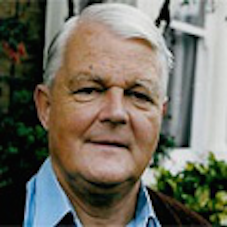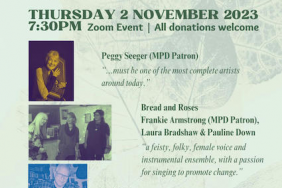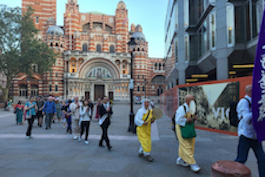Bruce Kent: A Priest for all Seasons

Bruce Kent/image ICN
There are clerical lives that at first follow the beaten track: Hampstead Garden Suburb to Stonyhurst, two years a second lieutenant in the 6th Royal Tank Regiment, seminary training at St Edmunds College Ware, Brasenose College Oxford for a law degree, ordination in 1958, curacy at Our Lady of Victories, Kensington and just five years later personal secretary to the new Cardinal Archbishop of Westminster, John Heenan. Then the unexpected, a path less trodden, not a sudden leap into the unknown, more a developing vocation within a vocation: a priestly life of work for peace and justice including a decade as leader of the British Campaign for Nuclear Disarmament, CND. Such was the extraordinary life of Bruce Kent who has died a few weeks short of his 93rd. birthday.
Both Bruce Kent's parents were Canadians, his mother a pious Catholic, his father, a Presbyterian with Montreal sectarian views, working in London for the Pennsylvania Armstrong Cork Company. Bruce's warm look of approval when a cork was pulled may not have been entirely filial respect. His father had been opposed to his becoming a priest. When a Pax Christi member knocked on his door in 1958 and invited him to become its chaplain Bruce happily accepted, the first small step into his lifetime's work.
Cardinal Heenan, easily irritated by minor lapses in protocol, moved him on to chair the Westminster Diocese Schools Commission, the beginning of Bruce's lifelong interest in peace education. Generations of school children will remember the charming, amusing and avuncular figure who talked about peace and peace-making, the arms trade and nuclear weapons. In one prolonged burst of activity for a one-year peace education project he spoke to 150 schools. He was a great raconteur and had a gift for communicating with all age-groups addressing causes of problems not just symptoms.
From 1966 -1974, Bruce was chaplain to London University. Like other priests engaging with students during this time of heightened student activism - think of Albert Nolan at Stellenbosch in South Africa and Gustavo Gutierrez in Peru's National University in Lima - this was a liberating and radicalising experience. Still known as Monsignor Kent, in 1967 he began a long letter-writing career denouncing the naval chaplain in The Times for blessing the new Polaris submarine at its launch on the Clyde. He later conducted an exorcism at the Faslane nuclear submarine base and called on naval personnel to disobey immoral orders. "From the willingness to murder, Good Lord, deliver us." And he quietly practised the traditional corporal acts of mercy, visiting the sick and the imprisoned. Among the items on his desk at the time he died lay the list of prisoners to whom he was writing regularly. He never gave up.
For Bruce, visiting war-torn and starving Biafra in 1969 and in 1971, the India-Pakistan war zones during a War on Want relief initiative, was an emotional turning point. He became profoundly aware of the horror of war and the hypocrisy of governments permitting the selling of arms to belligerents on both sides. In 1974 he became chairman of War on Want and helped to found the Campaign against the Arms Trade. Cardinal Heenan's successor, Archbishop Basil Hume, later Cardinal, took a typically softer line on his peace and justice work, while Bishop Victor Guazzelli, auxiliary bishop of East London, was an understanding supporter during Bruce's time in St Aloysius parish in Euston.
During the intensification of the Cold War under Thatcher and Reagan the peace movement gained in strength. In 1980 Bruce Kent began taking on leadership roles in the peace movement and, as General Secretary of CND became a national figure, demonstrating his great talent for communication on radio and television. CND under his direction experienced a renaissance, supporting the Women's Peace Camp at Greenham Common campaigning against the siting of Cruise Missiles at the American airbase. Following ratification of the Intermediate-Range Nuclear Forces Treaty by Reagan and Gorbachev in June 1988, the last Ground Launched Cruise Missiles at RAF Greenham Common were removed in March 1991.
Under Bruce's ten years of leadership CND grew its national membership from 2,000 to 100,000 and increased its 30 active local groups to nearly 1,000. In 1982 he organised lobbying of the UN Second Special Session on Disarmament in New York. From 1985 to 1992 he was President of the International Peace Bureau, one of the oldest international peace organizations founded in 1891. Foreign visits included the Japan, Australia, New Zealand, the USA and USSR. In 1988 he undertook a 1,000 mile walk for peace from Warsaw to Brussels. His prodigious energy sustained him through innumerable journeys by sleeper and endless travels for talks.
In the early 1980s Julian Lewis, later MP and from 2020 chairman of the House of Commons Select Intelligence and Security Committee , at that time research Director of the Coalition for Peace Through Security, an organization promoting government defence policy and opposed to CND, challenged Cardinal Hume to do something about his troublesome priest. Like the anti-apartheid movement, the peace movement did have strong Communist backing. Michael Heseltine once declared all CND members were communists or fellow-travellers warning he had their names. Bruce experienced his share of this kind of calumny even from within the Church. Though, at least superficially, it didn't seem to bother him. More disturbing was having phones tapped and the shocking revelation that an undercover agent had been planted in the CND office.
On 11 February 1987, Monsignor Kent amicably ended his diocesan employment and, in his own words, retired. He made it clear that he hadn't stopped being a priest, in other words that he would not seek laicization. Fourteen months later he married Valerie Flessati, a fellow Catholic peace activist whom he had known for many years through Pax Christi. It was a marriage whose happiness was born of love and shared vision, a genuine partnership which brought hope and inspiration to many. He remained an active Mass going Catholic for the rest of his life.
Describing this period in an autobiography he summed up his basic difficulty - frequently misinterpreted - with the Church hierarchy:
"If there was a problem for the Church it lay in the contrast between the official idea of what a priest ought to be and what a priest actually was in many parts of the world. Support for Solidarnosc in Poland was priestly. Support for the Sandinistas in Nicaragua was not. To be Bishop of HM Forces was not political. To be CND Chairman was. My position was an impossible one. Many of my fellow Catholics, and other Christians, told me that what I was doing as a priest gave them hope, though I knew that most of my bishops did not think my work was priestly".
Throughout his long life Bruce Kent responded to fresh challenges and opportunities speaking out against resort to military force and promoting the United Nations, international law, and other non-violent avenues for conflict resolution. He campaigned unsuccessfully as Labour candidate for Oxford West and Abingdon in 1992. In debate he could more than hold his own - memorably against Sir Michael Quinlan, Permanent Secretary of State for Defence 1988-1992 and former chairman of The Tablet Trust.
Never afraid to innovate Bruce more recently began bringing environmental concerns into peace and justice issues. He accepted invitations from Muslim organisations, and, notably in the wake of the 7/7 bombings in London, supported multi-faith initiatives against Islamophobia or religious intolerance of any kind. He often pointed out parallels between the experience of Catholics persecuted in past centuries and the fomenting of suspicion about Muslims.
Much less known is his work with prisoners, visiting them, writing to them in lock-down, helping them. He co-founded and worked in Progressing Prisoners Maintaining Innocence helping prisoners claiming miscarriage of justice. His deep ingrained human sympathy is reflected in the avalanche of tributes on social media after his death - from individual Hiroshima and Nagasaki Hibukusha (atomic bomb survivors) to the Friends of Finsbury Park. Ironically he was IT-phobic and never came to terms with social media himself.
Despite the peace movement's extensive international links Bruce was essentially a Londoner. His and Valerie's little flat near Finsbury Park had just enough space between the books, newsletters and pamphlets for their two desks and for entertaining. Valerie, between her writing, her research into local conscientious objectors, planning the next public event or campaign, provided delicious meals from an equally small kitchen.
In 2019 Bruce Kent was awarded the Sean MacBride Peace Prize by the International Peace Bureau. In 2021 the Archbishop of Canterbury awarded him, jointly with Valerie Flessati, the Lambeth Cross for Ecumenism. He lived to see the UN Treaty on the Prohibition of Nuclear Weapons enter in force the same year.
I shall think of Bruce every time a newsletter from the Movement for Abolition of War, which he founded at the turn of the century, comes through the letter box. Blessed are the peacemakers. But it is sad that that such a beautiful Catholic life should end at the beginning of a terrible European war. In the words of Archbishop Malcolm McMahon of Liverpool speaking on the Sunday programme: "Bruce was a great gift to the Church and, indeed, to Society".
Bruce Kent, priest, peace campaigner and friend. Born London 22 June 1929; died London 8 June 2022
Professor Ian Linden is Visiting Professor at St Mary's University, Strawberry Hill, London. A past director of the Catholic Institute for International Relations, he was awarded a CMG for his work for human rights in 2000. He has also been an adviser on Europe and Justice and Peace issues to the Department of International Affairs of the Catholic Bishops Conference of England and Wales. Ian chairs a new charity for After-school schooling in Beirut for Syrian refugees and Lebanese kids in danger of dropping out partnering with CARITAS Lebanon and work on board of Las Casas Institute in Oxford with Richard Finn OP. His latest book was Global Catholicism published by Hurst in 2009.
Visit his website here: www.ianlinden.com


















